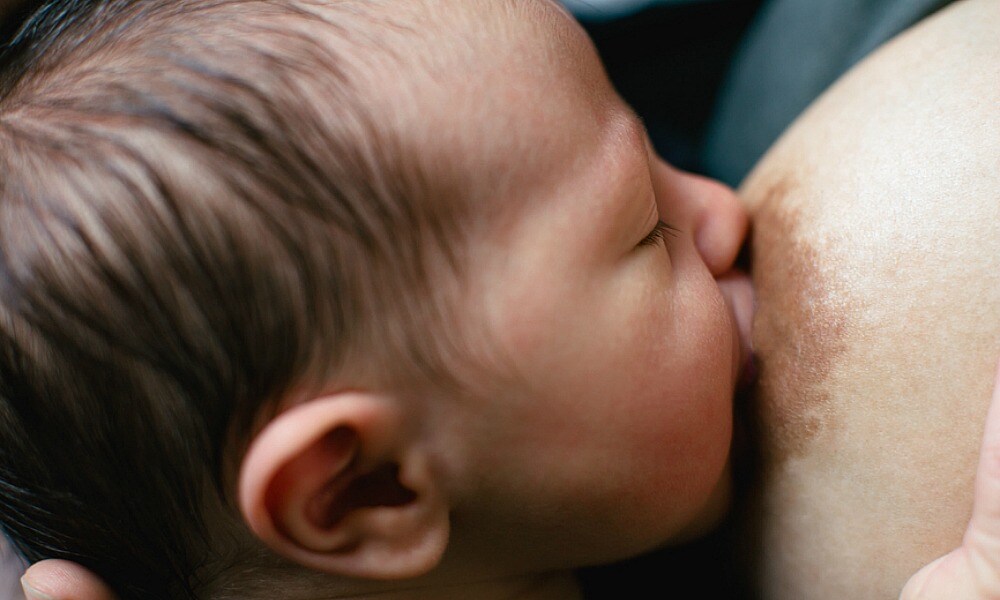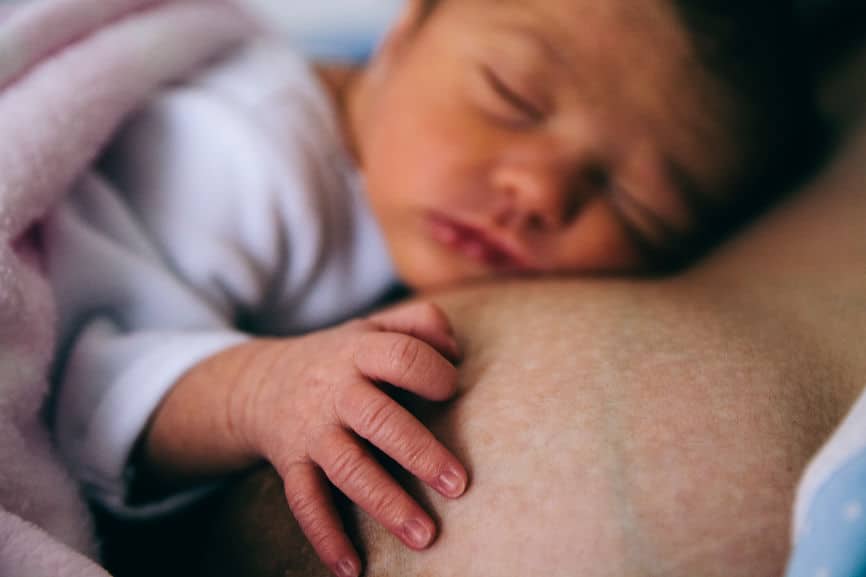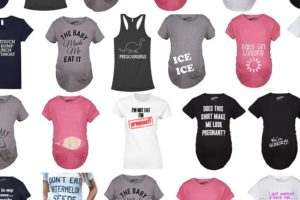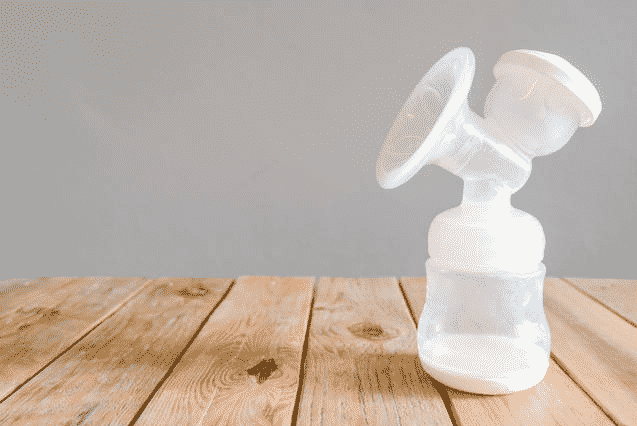The advantages and benefits of breastfeeding are vast. In fact, they are life-changing, and those benefits will continue years after you stop breastfeeding.
Not everyone is able to breastfeed. However, if you are able to breastfeed, you should make every effort to do so because the benefits are truly profound!
Now, of course, there are a few disadvantages of breastfeeding. For example, you won’t know how much milk your baby is actually drinking, no one else can feed your baby so you’ll never really get a break, and breastfed babies need to eat more often—which is really bad for your sleep. But despite these drawbacks, the benefits of breastfeeding vastly outweigh the disadvantages.
This is a comprehensive list of how breastfeeding affects your baby, your society, and you!
Contents

The Benefits Of Breastfeeding For Your Baby
-
Skin-to-Skin Contact Creates A Deeper Bond
Breastfeeding is a great bonding experience for the mother and baby. Of course, bottle-fed babies form bonds with their parents too, but that skin-to-skin contact that comes with breastfeeding builds trust between mother and baby. Nursing time is your cuddle time, your alone time. You learn each other’s cues, you exchange looks, noises. You communicate love and affection for each other. It’s a very special time, and it’s especially reassuring to a newborn baby.
-
Breastmilk Is Custom Made
Formula can’t change its constitution, but breast milk morphs to meet your baby’s changing needs. In fact, your breast milk is specifically tailored to your baby.
Breast milk can and does change during each feeding, from one feeding to another throughout the day, and over time to meet the needs of your baby. For example, when a mom or her baby is sick, antibodies are produced in breast milk, thereby protecting both mom and baby.
-
Breastfeeding Is Soothing To A Baby
Breastfeeding calms a child. It can even help your baby/toddler handle stress better when not breastfeeding, according to this study.
Based on a 2009 study published in the journal Pediatrics, breastfeeding is more effective than any other intervention (being held, oral glucose solution, sucking on a pacifier, or formula feeding) in reducing a baby’s pain after a heel prick. This was measured by several factors including the baby’s heart rate and the amount of crying.
You may have heard people say that if you are a breastfeeding mom, you should not allow your baby to use you as a pacifier. They say things like “that baby is not hungry, he’s is just comfort feeding.” However, according to lactation consultant, Fleur Bickford, that’s okay. “Babies go to the breast for many reasons — they’re hungry or thirsty, they’re tired, they’re scared or hurt, they’re feeling overwhelmed. All of these are equally valid reasons for a baby to nurse.”
-
Breastfeeding Helps A Baby Sleep
Amongst others, breastmilk contains tryptophan—an amino acid, and sleep-inducing hormone. Tryptophan is used by our bodies to make the hormone melatonin, and melatonin helps induce and regulate sleep.
The levels of tryptophan in breastmilk increase and decrease according to your maternal circadian rhythms. That means the concentration of tryptophan is higher during the night.
Breastfeeding exclusively, but particularly at night, may actually help your baby establish their own circadian rhythms. Therefore, breastfeeding your child to sleep and for comfort is not a bad thing at all! It’s normal, it’s healthy and it is developmentally appropriate.
-
Breastfeeding Helps A Baby’s Dental Development
Babies who are exclusively breastfed for the first 6 months are less likely to have teeth alignment issues like open bites, crossbites, and overbites, than those exclusively breastfed for shorter lengths of time or not at all – this according to the Journal of the American Dental Association – August 2017.
-
Breastmilk Is More Nutritious Than Formula
Breastmilk is amazing in many ways! Excluding vitamin D, breast milk contains all the essential vitamins and minerals that a baby needs in its first year of life—this according to the American Academy Of Pediatrics.
- Breast milk is able to change its composition to meet the needs of your baby or toddler.
- It contains all kinds of immunity-boosting antibodies and healthy enzymes.
- The iron content of breast milk is low at around 0.5 mg/L. Compare that with formula, which is around 10 to 12 mg/L. However, the absorption rate of the iron in breastfed milk is considerably higher. Breastfed babies absorb up to 50% of consumed iron, compared with a 7-12% absorption rate for formula-fed babies.
- Breast milk offers enzymes, antioxidants, immune properties, and live antibodies from mom—all of which are abundant, and easily absorbed by your baby.
- A mother’s more mature immune system makes antibodies to germs that she and her baby may have been exposed to. The antibodies go into her milk to help protect her baby from illness. Immunoglobulin A helps to coat the lining of her baby’s immature intestines, thereby preventing germs and allergens from leaking through.
-
The Colostrum in Breastmilk Is A Wonder Food
After the birth of your baby, your breast will produce colostrum. It’s a thick, yellowish fluid that is high in protein, fats, salts, and vitamins for complete nutrition. It is also low in sugar and packed with beneficial compounds. It is complete nutrition that your baby’s stomach can easily digest. It’s the perfect food for your newborn. It’s like a wonder food that formula cannot replace.
- Colostrum contains antibodies and white blood cells, so it helps your baby build a strong immune system;
- It creates a tough coating on your baby’s stomach & intestines to keep germs from causing illness and prevent inflammation;
- Colostrum helps prevent jaundice;
- It acts as a laxative to help your baby pass meconium (which is that first, dark poop).
- Colostrum gives your baby’s brain, heart, and eyes the right blend of nutrients to grow;
- It helps get rid of harmful waste products in your baby’s body.
- It helps to prevent low blood sugar in newborns.
-
Breastfeeding Promotes A Baby’s Healthy Weight
Breastfeeding promotes healthy weight gain and helps prevent childhood obesity.
- According to Harvard Health, babies who drink breast milk are more likely to have certain bacteria in their digestive tracts that help prevent obesity.
- Breastfed babies self-regulate their milk intake. They tend to be better at eating until their hunger is satisfied. This helps them develop healthy eating patterns.
- Another theory is that nursing moms get in tune with signals that their baby is full, and therefore they don’t overfeed;
- Compared to formula-fed babies, breastfed babies have more leptin in their systems, which is a key hormone for regulating appetite and fat storage;
- Finally, according to this study, breastfeeding for longer than 4 months leads to the development of beneficial gut bacteria, which may affect fat storage.
-
Breastfeeding Reduces The Risk Of Asthma
According to Science Daily, “Feeding a baby on only breast milk and for up to 6 months after birth can reduce their risk of developing asthma-related symptoms in early childhood.”
-
Breastfed Babies Are Stronger Against Viral And Bacterial Infections
Breastmilk contains valuable antibodies that protect babies against viral and bacterial infections like:
- Bacterial meningitis
- Respiratory tract infections
- Ear infections
- Necrotizing Enterocollitis
- Urinary tract infections
- Necrotizing Enterocollitis
The beautiful thing about breastfeeding is that the longer you breastfeed, the more protection your baby has.
-
Breastfeeding May Make Your Baby Smarter
The research is inconclusive, but studies are pointing toward breastfed babies having higher IQ scores later in life, despite socioeconomic factors. The fatty acids in breast milk are thought to be brain boosters.
This difference between breastfed and formula-fed babies may be due to the touch, eye contact, physical intimacy, and nutrient content associated with breastfeeding.
-
Breastfed Babies Are Healthier
With stronger immune systems, breastfed babies experience:
- Fewer ear infections, especially the kind of infections that damage hearing;
- Fewer colds and respiratory illnesses like pneumonia, whooping cough, and respiratory syncytial virus (RSV);
- Better vision;
- Less retinopathy of prematurity;
- Less illness overall and less hospitalization;
- Parents have up to six times less absenteeism from work.
-
Breastfed Babies Have Less Behaviour Problems Than Formula Fed Babies
Studies indicate that breastfed babies and children who are breastfed for at least six months are less likely to develop behavioral problems or have learning difficulties as they grow older.
-
Breastmilk Helps To Protect Against Allergies And Eczema
The proteins in cow’s milk and soy milk formulas can stimulate an allergic reaction, whereas the proteins in human breast milk are more easily digested. Scientists believe that immune factors such as secretory IgA (only available in breast milk) help prevent allergic reactions to food by providing a layer of protection to a baby’s intestinal tract.
This is not to say that breastfed babies are 100% immune to allergies and eczema. Rather, it is recommended that if there is a history of allergies and/or eczema in your family, it may be especially beneficial for you to breastfeed your baby.
-
Breastfed Babies Suffer Less From Stomach Issues
Baby formula can cause stomach upsets in babies. This is less the case with breastfed babies because breast milk is easy for a baby’s body to break down. Therefore, breastfed babies will experience less constipation, diarrhea, gastroesophageal reflux, gastroenteritis, inflammatory bowel disease, and preterm necrotizing enterocolitis (NEC).
-
Breastfeeding Leads To A Lower Risk Of Infant Mortality And SIDS
Although the connection still seems to be unclear, breastfed babies account for only half the SIDS (sudden infant death syndrome) cases compared to formula-fed babies. It is said that breastfeeding lowers the risk of SIDS because breastmilk provides the best nutrients for brain development.
-
Breastfeeding Makes Vaccines More Effective
The research is clear—breastfed babies have a better antibody response to vaccines than formula-fed babies do.
But there’s more! You may have heard that babies can become very fussy and develop fevers after their routine vaccinations, thereby resulting in a sleepless night for mom. However, research conducted in Naples, Italy, revealed that exclusively breastfed babies are less likely to develop a fever when compared to babies who are partially breastfed and those who are exclusively formula-fed.
-
Breastfeeding Can Reduce The Risk Of Crohn’s Disease
Several studies show that people with Crohn’s disease were more likely to not have been breastfed as infants. The study concluded that there is a protective effect in breastfeeding.
How Long Do The Benefits Of Breastfeeding Last?
The benefits of breastfeeding are vast. If the research and studies are correct, your baby will benefit for a lifetime.
The Breastfeeding Benefits For Children
- Breastfed children have improved brain maturation;
- As children, they have fewer instances of allergies, eczema, and asthma;
- They have greater immunity to infection;
- They experience less speech and orthodontic problems;
- They have fewer cavities;
- There are fewer childhood cancers, including leukemia and lymphomas;
- There is a lower risk of type I and II diabetes in children who were breastfed;
- There are fewer instances of Crohn’s disease and colitis;
- There are lower rates of respiratory illness; and
- There is a smaller likelihood of becoming obese later in childhood.
As children get older and become adults, those benefits persist.
The Benefits Of Breastfeeding – Teens and Adults
- Teens and adults are less likely to develop rheumatoid arthritis and lupus;
- They experience a lower risk of multiple sclerosis;
- They are less likely to develop heart disease in adulthood;
- There are lower rates of pre-and postmenopausal breast cancers.

The Benefits Of Breastfeeding For Mom
For a baby, the benefits of breastfeeding are huge and possibly life-altering. But the benefits don’t end with your child. You benefit from breastfeeding too!
-
Breastfeeding Helps You Lose The Pregnancy Weight
Producing milk is hard work. If you are breastfeeding exclusively, you’re likely to burn around 300 to 500 calories a day.
With that many calories burned per day, breastfeeding moms find it easier to lose their pregnancy weight in a healthy way—that is, slowly and without dieting.
-
Breastfeeding Is Almost Free
Free & Optional – Lactation Consultant: at most hospitals, a lactation consultant will be made available to you free of charge. Use her while you are in the hospital! However, if you need help after you leave the hospital, you may need to pay for the services of a lactation consultant.
Free & Optional – Breast Pump: if you plan to pump breastmilk, you will need a breast pump. You can buy a breast pump if you have a specific model in mind, but if you are on a budget, don’t do that. Breast pumps are free through your insurance. By pumping breastmilk, you will also need supplies like milk storage freezer bags, and bottles.
Paid But Optional – Breastfeeding Covers: they are otherwise known as udder covers. Some women feel comfortable breastfeeding in public, so if this is you, you won’t need to cover yourself.
Paid But Optional – Breastfeeding Pillow: some moms can’t do without them, some moms feel they are a bother. You will need to experiment to see if you need one, or not.
Paid And Necessary – Nursing bras and tops: these are really the only things you will need to invest in to make your breastfeeding journey easier.
So if you’re on a budget, breastfeeding could cost you nothing but breastfeeding bras and tops. But, by choosing to breastfeed, you save big! You will not need to:
- spend money on formula. According to La Leche League International, the price of formula can range anywhere from $134 – $491 a month. That is a whopping $1,608 to $5,892 for a year! Even if you choose to buy several nursing bras and tops, you’ll never get close to the cost of a year’s supply of formula.
- you will never need to calculate how much milk your baby needs to drink daily;
- you will not need to get up at night to mix and warm up bottles;
- you will not need to clean and sterilize bottles;
- you will never need to worry about warming bottles if you’re on the go because breastmilk is always available and always at the right temperature.
-
Breastmilk Is Never Contaminated
In 2008, there was melamine found in baby formula in China and the USA. Melamine is a toxic chemical that has sickened tens of thousands of infants in China.
-
Breastfeeding Makes You Feel Good
Thanks to the release of “good” hormones, moms feel fulfillment and joy from the physical and emotional connection they have while nursing. These hormones include:
- Prolactin, which produces a nurturing, peaceful sensation. This allows you to relax and focus on your child.
- Oxytocin, which promotes a strong sense of love and attachment between you and your baby.
It is also immensely empowering as a mother to see your baby grow and thrive, and know that it is from your breast milk alone.
-
Breastfeeding Is Easy!
There is nothing easier—certainly not formula feeding. All you do is pull up your shirt and nurse. Your breast milk is always available and always at the right temperature.
-
Moms Who Breastfeed Have Lower Risk Of Depression
Studies indicate that, compared to moms who wean early or do not breastfeed, moms who breastfeed seem less likely to develop postpartum depression.
-
Breastfeeding Can Be A Natural Contraceptive
Breastfeeding is not as reliable as a condom, the pill, or other forms of birth control, but it can keep you from ovulating.
-
Breastfeeding Triggers Your Uterus To Shrink Back To Pre-Pregnancy Size
In the first few weeks after birth, you might feel mild contractions while you’re nursing. This is completely normal and expected. It’s your uterus doing what it’s supposed to do.
-
Breastfeeding Lowers The Risk Of Breast And Ovarian Cancer
The total time you spend breastfeeding is linked with a reduced risk for breast and ovarian cancer Australian researchers have discovered that women who breastfed for more than 13 months were 63% less likely to develop ovarian cancer compared to women who breastfed for less than seven months.
It gets even better! Women who have (or plan to) breastfed multiple children for more than 31 months could reduce their ovarian cancer risk by up to 91%, compared to women who breastfed for less than 10 months.
-
Breastfeeding Moms Have Lower Risk Of Disease
Studies indicate that breastfeeding seems to provide you with long-term protection and lower risk for:
-
Breastfeeding Delays Menstruation
Exclusively breastfeeding your baby will delay ovulation, which leads to delayed menstruation.
According to Heather Kelly, an international board-certified lactation consultant in New York City, “Breastfeeding causes the release of prolactin, which keeps estrogen and progesterone at bay so ovulation isn’t triggered. When your prolactin levels drop, those two hormones can kick back in, which means ovulation—and, hence, menstruation—occurs.”
But don’t get too excited—your holiday from menstruation will end. Even if you breastfeed exclusively, your prolactin levels will eventually drop, and therefore lead to you getting your period. This can happen between six months to a year after delivery.
-
Breastfeeding Lowers Your Risk of Osteoporosis
Moms who breastfed have a lower risk of postmenopausal osteoporosis. This is because breastfeeding women absorb calcium much more efficiently.
The Benefits Of Breastfeeding For Society

-
Breastfeeding Is Environment Friendly
If our planet is important to you, or you feel a sense of responsibility, choosing to breastfeed is a wise idea. Reducing plastic baby bottles and formula containers is great for our planet!
With breastfeeding, there are no wasted resources. No one is using scarce resources, and certainly, there is no pollution because breast milk is a naturally-renewable resource that requires no packaging, shipping, or disposal.
On the other hand, the production of baby formula (from dairy cows) is vastly different.
- Dairy cows are a significant contributor to global warming! Their flatulence, belching, and manure spew huge amounts of methane, (which is a harmful greenhouse gas), into our atmosphere.
- Breastfeeding reduces global pollution in a big way. Breastfeeding decreases the use of resources and energy and fuel that are required to produce, process, package, distribute, promote and ultimately dispose of all the materials used to produce baby formula. This includes glass, plastic, metal, and paper, which will inevitably land up as waste for landfills.
-
Breastfeeding Results In Birth Spacing
If you are breastfeeding exclusively, you are not ovulating (at least for the first six months after your baby is born). Since you’re not ovulating, you cannot get pregnant. This offers sufficient birth spacing between siblings.
-
Cost Savings Beyond Your Household
Breastfeeding is essentially free to you as a mother, but your choice to breastfeed is far-reaching because it reduces the cost of healthcare. Because of the health benefits of breastfeeding, there will be no need for expensive health services that need to be paid for by insurers, government agencies, or your family.
Also, according to a study published in the journal Pediatrics, the United States would save about $13 billion per year in medical costs if 90 percent of U.S. families breastfed their newborns for at least six months.
As they grow older, breast-fed babies are less likely to need excessive medical attention.
-
Reduced Absenteeism
Because breastfed babies are generally healthier than formula-fed babies, parents will not need as much time to stay home to take care of them due to illnesses. Therefore, reducing the rates of absenteeism at work.
Note From The Author
I have five children. I breastfed them all for at least 18 months each, (the twins were 3). I’m grateful for that. However, I didn’t choose to breastfeed because of all the benefits of breastfeeding. In fact, I did not know about these benefits or the long-term consequences of breastfeeding. Really, I just breastfed because it was easier and cheaper. Thank goodness I did that, because now I have kids who are healthy, and we have very few issues to speak of.
But I have to admit – breastfeeding was not fun all the time. I clearly remember the painful engorgement. I remember the stress I endured when my milk supply was low, and I also remember feeling like a cow sometimes. What I’m saying is, is that it may not be easy all the time, but it will be worth it. Also, there is a solution to almost every breastfeeding problem.
If you are on the fence about whether you should breastfeed or not, I hope this post has pushed you off that fence. I have spent a ton of time creating this article because I wanted it to be helpful and comprehensive. If I can get one woman to breastfeed instead of formula feed, I believe it was worth it.
Good luck mama! You’re a superhero!
PREGNANT? HERE ARE A FEW HELPFUL RESOURCES:
A real answer to almost all...
- Awesome Pregnancy Announcement Ideas
- Every Question Answered About The Amazon Baby Registry
- Babymoon Ideas You Can Actually Use
- Flying While Pregnant
- All You Need To Know About The Amazon Baby Registry Discount
- Everything You Need To Know Before You Start A Baby Registry
- The Best Pregnancy Movies And Documentaries
- Beautiful Baby Shower Corsage And Maternity Sash Ideas
- How To Assemble A “Daddy Doody Kit” Like A Pro
your pregnancy questions
- Ideas on How To Create Stunning Maternity Photos
- Beautiful Milk Bath Photography
- How to Get Your Amazon Baby Registry Welcome Box
- How Big Is My Baby? Use A Fetal Growth Chart To Track Your Baby Size By Week
- FREE Printable Maternity Photo Props
- Easy And Hilariously Funny Pregnant Halloween Costumes
- The Prettiest Winter Maternity Photoshoot Ideas
- New Baby Essentials Checklist
- Cute Grandma Names To Capture Her Personality
- 36 Funny Maternity Shirts For Cool Moms












